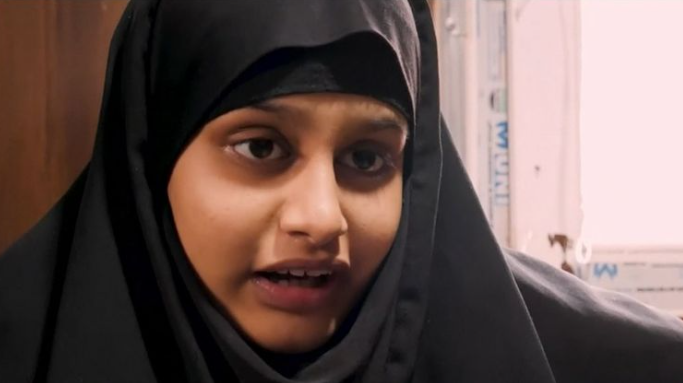A British woman whose UK citizenship was revoked after she travelled to Syria to join the Islamic State group has lost an appeal in her fight to restore her citizenship.
Shamima Begum, now 23, was 15 years old when she and two other girls from London joined the extremist group in February 2015.
Authorities withdrew her British citizenship on national security grounds soon after she surfaced in a Syrian refugee camp in 2019.
READ MORE: Russia ‘tested nuclear missile’ when Biden made Ukraine visit

The Special Immigration Appeals Commission, a tribunal which hears challenges to decisions to remove someone’s British citizenship on national security grounds, ruled there was a “credible suspicion” that Begum was trafficked to Syria for “sexual exploitation”.
It said there also were “arguable breaches of duty” by state bodies in allowing her to travel to the country.
READ MORE: Harry and Meghan respond to South Park mockery and ‘boring’ lawsuit reports
But Judge Robert Jay said that evidence was “insufficient” for Begum to win the argument that the deprivation of her British citizenship failed to respect her human rights.
Given that she remains in Syria, UK authorities are not compelled to facilitate her return, the judge said.

“Reasonable people will differ as to the threat she posed in February 2019 to the national security of the United Kingdom, and as to how that threat should be balanced against all countervailing considerations,” Jay said in delivering the decision of the tribunal.
“However, under our constitutional settlement, these sensitive issues are for the secretary of state to evaluate and not for the commission.”
Begum’s lawyers criticised Wednesday’s ruling as a “lost opportunity to put into reverse a profound mistake and a continuing injustice.”
“The outcome is that there is now no protection for a British child trafficked out of the UK if the home secretary invokes national security,” Gareth Pierce and Daniel Furner, of Birnberg Pierce Solicitors, said in a statement seen by UK news agency PA Media.
“Begum remains in unlawful, arbitrary and indefinite detention without trial in a Syrian camp. Every possible avenue to challenge this decision will be urgently pursued,” it continued.

Rights group Amnesty International described the ruling as a “very disappointing decision.”
“The power to banish a citizen like this simply shouldn’t exist in the modern world, not least when we’re talking about a person who was seriously exploited as a child,” Steve Valdez-Symonds, the group’s UK refugee and migrant rights director, said in a statement.
“Along with thousands of others, including large numbers of women and children, this young British woman is now trapped in a dangerous refugee camp in a war-torn country and left largely at the mercy of gangs and armed groups.”
Valdez-Symonds said, “The home secretary shouldn’t be in the business of exiling British citizens by stripping them of their citizenship”.
Begum had challenged the action of Sajid Javid, the UK’s home secretary at the time, arguing that it left her stateless and that she should have been treated as a child trafficking victim, not a security risk.

The British government claimed she could seek a Bangladeshi passport based on family ties. But Begum’s family argued that she was from the UK and never held a Bangladeshi passport.
Javid, the home secretary who removed Begum’s British citizenship, welcomed Wednesday’s ruling, tweeting that it “upheld my decision to remove an individual’s citizenship on national security grounds”.
“This is a complex case but home secretaries should have the power to prevent anyone entering our country who is assessed to pose a threat to it,” Javid added.
Begum has made several public appeals as she fought against the government’s decision, most recently appearing in BBC documentary The Shamima Begum Story and a 10-part BBC podcast series.
In the podcast series she insisted that she is “not a bad person”. While accepting that the British public viewed her as a “danger” and a “risk”, Begum blamed this on her media portrayal.

She challenged the UK government’s decision to revoke her citizenship but, in June 2019, the government refused her application to be allowed to enter the country to pursue her appeal.
In 2020, the UK Court of Appeal ruled Begum should be granted leave to enter the country because otherwise, it would not be “a fair and effective hearing”.
The following year, the Supreme Court reversed that decision, arguing the Court of Appeal made four errors when it ruled that Begum should be allowed to return to the UK to carry out her appeal.
The immigration tribunal held a hearing in November on Begum’s appeal. The case threw into sharp relief the larger question of how Western societies deal with people who joined IS but want to go back to their home countries. Many remain in camps in northeast Syria.
Begum fled east London with two friends to marry IS fighters in Syria at a time when the group’s online recruitment program lured many impressionable young people to its self-proclaimed caliphate.
Begum married a Dutch man fighting for IS and had three children, all of whom died.
But her apparent lack of remorse in interviews soon after she surfaced in the refugee camp triggered criticism in Britain. Her tone has changed since then as she reflected on her actions and fought to return home.



